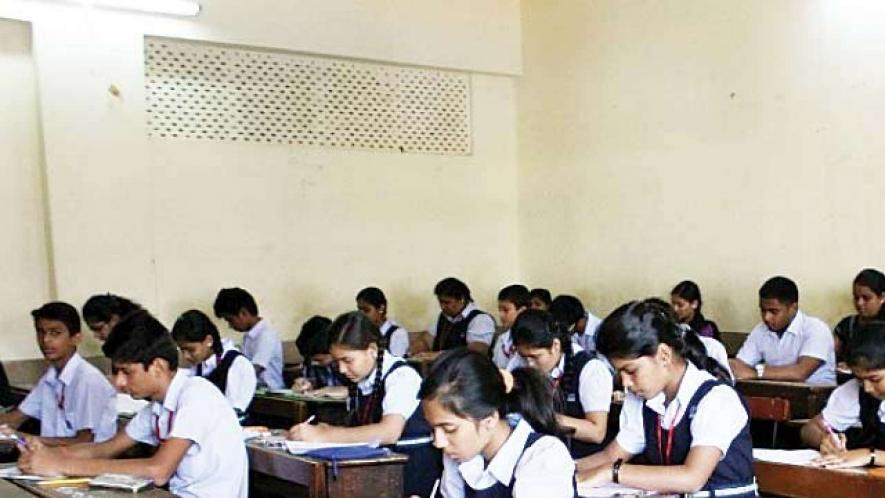The Three Chapters CBSE Wants Erased From Class IX Textbooks

representational Image.Image Coutesy: DNA
New Delhi: The Central Board of Secondary Education (CBSE) has directed the National Council of Educational Research and Training (NCERT) to delete at least 70 pages from class 9 social sciences text books comprising three chapters.
One of the topics to be dropped from the textbook, as per a report in The Indian Express, pertains to ‘Caste conflict and dress change’ that talks about caste conflict through the struggles of the so-called “lower caste” Nadar women of Travancore, who were forced to keep their upper bodies uncovered.
“No questions from the section should be asked in 2017 Summative Assessment,” a Board circular addressed to teachers and students read. The topic features in ‘India and the contemporary world-I’, one of the social science textbooks published by the NCERT and used in CBSE schools across the country.
The decision is part of the curriculum rationalisation exercise initiated by Human Resource Development Minister Prakash Javedkar ostensibly to reduce the “burden” on students.
The revised textbooks are expected to hit the stands this month before the new academic session begins. This is the second textbook review undertaken under the Narendra Modi government after NCERT had made 1,334 changes, which included additions, correction and data update in 2017.
Out of the three chapters deleted, ‘Clothing: A social history’, the Nadar community is referred to under the ‘caste conflict and dress change’ sub-head, wherein it is stated that a majority of them were considered a ‘subordinate caste’ and that they were expected to follow the local custom of not covering their upper bodies.
The reference to the Nadar community in the textbook had triggered a major controversy in 2012 also and had invited flak from political parties.
DMK leader M. Karunanidhi and MDMK chief Vaiko had said it was unpardonable to describe the Nadars as a community of migrants whereas PMK leader S. Ramadoss also criticised certain objectionable remarks against Nadar women in the textbook.
Later that year, the then Chief Minister, late J Jayalalithaa, had also written to the Centre seeking removal of the “objectionable” portions.
In 2016, “caste conflict and social change” based on the strict social codes regarding food and dress in India in the past, made headlines when politicians objected to references to the 'Upper Cloth Revolt' in southern India.”
The second chapter to be omitted, ‘History and Sport: The Story of Cricket’, is on the history of cricket in India and its connection with the politics of caste, region and community. The third chapter, ‘Peasants and Farmers’ focuses on the growth of capitalism and how colonialism altered the lives of peasants and farmers.
The chapter ‘Peasants and Farmers’ focused on three countries- small cottagers in England, wheat farmers of the US and opium producers of Bengal. The chapter deals with what happened to different rural communities after the advent of modern agriculture and explains what happened to different regions of the world when they integrated with the capitalist world market.
This is not the first time the Bharatiya Janata Party regime in power has re-written history to suit a certain narrative. The Narendra Modi government has repeatedly been accused of ‘saffronising’ education – particularly by editing history textbooks.
In recent years, the NCERT was under pressure to replace a reference to the ‘Anti-Muslim riots in Gujarat’ in the political science textbook for Class XII to simply the ‘Gujarat Riots’ in addition to changing the interpretation of Hindutva. A passage in the book, which carried former Prime Minister Atal Bihari Vajpayee’s famous ‘raj dharma’ quote was also reportedly considered unnecessary.
According to reports, NCERT insiders said the manner in which the changes were being pushed had rendered the council, once a thriving intellectual place with its own mind, into a toothless body.
In the current Government’s tenure, there were several reports for a demand for a new National Curriculum Framework (NCF)- the vision document that shapes what will be taught and how in India’s schools.
With the country drawing close to the General Election starting April 2019, neither the Union HRD Ministry nor the NCERT are showing any signs of following the tedious route of creating a new NCF – which would involve consultations with a variety of experts and stakeholders.
Read More: https://www.newsclick.in/tripura-cm-implement-ncert-syllabus-says-students-need-learn-hindu-kings
Get the latest reports & analysis with people's perspective on Protests, movements & deep analytical videos, discussions of the current affairs in your Telegram app. Subscribe to NewsClick's Telegram channel & get Real-Time updates on stories, as they get published on our website.
























